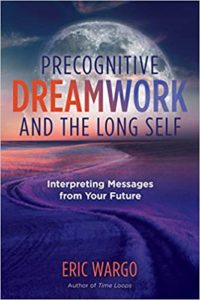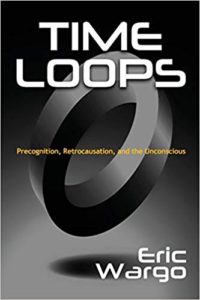The Amazing Reality of Dream Precognition
Reposted with permission from Inner Traditions’ “Off the Shelf” blog.
Throughout history and in most if not all cultures, the phenomenon of dreams seeming to foretell future experiences—what we now call precognitive dreams—has been accepted as a normal, even unremarkable, feature of sleep. Yet mainstream psychology continues to deny—or at least ignore—this belief.
I’m here to tell you, with great confidence, that the skeptics are wrong. It is not just superstition or wishful thinking. There is overwhelming evidence that dreams can and do foreshadow experiences ahead in one’s life. For the past 10 years I’ve been collecting and studying this evidence. Here are just a few publicly available examples, to whet your appetite:
A retired London art teacher named David Mandell awakens from a terrifying dream on September 11, 1996, about two tall towers crashing to the ground in some kind of explosion or earthquake, and paints the scene in watercolors. He also has himself photographed with his painting in front of the clock at his local bank—a habit he developed to authenticate and date his dream-paintings, since they often predict the future. Six months later, he has another similar dream, and then the following year he dreams about planes crashing into buildings. (He paints these as well.) He is stunned on the morning—or for him, afternoon—of September 11, 2001, when the scene from his dreams unfolds in real time on television, five years to the day after he first dreamed of it.
In November 16, 1995, astronomer Paul Kalas dreams about a strange, highly asymmetrical debris ring around a distant star. He writes the dream and draws a picture of the debris ring in his dream journal. Nine years later, almost to the day, he makes a landmark discovery of a highly off-center debris ring circling the star he is then studying, Fomalhaut, and finds that the Hubble Space Telescope photograph closely matches the drawing he had made of his dream. His discovery of this unique debris ring leads to the first photograph of an exoplanet in visible light—a planet that he had predicted would be on the elliptical boundary of that debris ring.
After being struck by lightning in the parking lot of her synagogue in 1988, a Houston mother named Elizabeth Krohn starts to dream frequently about disasters that later occur, especially plane crashes. For example, on January 15, 2009, Krohn dreams of an American airliner—she thinks it is either Southwest or US Airways—crashing in the water in New York City. She emails herself the dream to provide a date and time stamp; she also tells her husband that, impossibly, the passengers are standing on the wing of the plane. Six and a half hours later, Captain Chesley “Sully” Sullenberger deftly pilots his damaged US Airways jet to a safe water landing on the Hudson River. Photos that went viral within minutes of the event show the lucky passengers lined up along the wings awaiting rescue by nearby boats.
Or perhaps my favorite: Long before his writing fame, 17-year-old Russian child of privilege Vladimir Nabokov loses his wealth in the revolution that swept away the old Tsarist order; but he dreams one night that the benefactor he had inherited his wealth from, his dead uncle Vassily, will come back to him as a pair of circus performers, “Harry and Kuvyrkin.” Over four decades later, now an émigré novelist making a modest living teaching literature at Cornell University, Nabokov learns that he is once again, for the first time since his youth, a wealthy man: Harris-Kubrick Pictures has bought the movie rights for his novel Lolita for a hefty sum. When anglicized, the circus performer Kuvyrkin in his dream would be Kubrick.
Experiences like these—and I could give you hundreds of similar ones—are head scratchers for sure. But no matter how amazing each example is individually, they don’t amount to much for most psychological scientists: they sound like anecdotes, not data. For nearly two centuries, since the advent of scientific psychology, most who try to bring objective tools to studying human behavior have denied that dreams could bring information about experiences ahead in the dreamer’s life.
It’s not that there’s actually any evidence against precognition. Quite the contrary: Researchers in the marginalized field of parapsychology have amassed statistically overwhelming evidence that it does exist. It’s just that such an idea runs counter to our culture’s taken-for-granted assumptions about causality: that it flows in a single direction, causes always preceding effects in time. Consequently, scientific psychologists and other skeptics will reach into a handy grab bag of well-known biases, and our general failure to understand statistics, to support their claim that dream-precognition claims are wrong. The fact that until recently there has been no well-understood physical theory that could make sense of such “backwards” experiences buttresses such dismissals—although that, as we will see, is changing.
The result is a massive truth gap when it comes to an activity we spend at least a few hours of every day doing: A divide between how mainstream psychologists and sleep scientists continue to attempt to explain dreams and dreaming (although to this day they have still never gotten their stories straight) and what many ordinary dreamers suspect, and some know beyond doubt, to be the case: that our minds/brains do in fact reach into our future when we sleep—astonishingly, sometimes even years or decades ahead in our lives.
The Citizen Science of Precognitive Dreamwork
“It’s a poor sort of memory that only works backwards.” – Lewis Carroll
What I’m hoping to do in my new book, Precognitive Dreamwork and the Long Self, is change the conversation around dreams and dream precognition, in an effort to close that truth gap. As part of this, I’m inviting readers—ordinary dreamers—to play the role of citizen scientists, crowdsourcing the study of this until-now virtually unexplored reality of our minds/brains.
Examining precognitive dreams collectively and comparatively, a clear inner anatomy of precognition begins to emerge, like a skeleton in an X-ray. Precognition turns out to be governed by consistent principles—perhaps even laws—and we as citizen scientists can begin to enumerate them.
In the book, I list 27 principles that I and a few collaborators have thus far identified (readers of the book will undoubtedly be able to help add to the list) as a way of orienting dreamworkers at this early stage of our collective investigation. The basic method of precognitive dreamwork, however, can be distilled to three basic steps. You can start tonight (well, tomorrow morning), and it is really easy:
1) Write down whatever dreams you can recall upon waking.
2) Free associate briefly on each of the details in a dream (“what’s the first thing this reminds me of?”) and write those associations down along with the dream narrative.
3) Take a minute or two to revisit your recent dream records, from at least the last few days, at the end of each day.
Lots of people who are interested in dreams do the first step anyway. And if you have experience with psychoanalytic dream interpretation, the second one may come naturally as well. It’s the third step that nobody thinks to do, but it’s the one that will reveal to you that a not-too-shabby portion of your dreams (a quarter, by some estimates—I think it is much more) do clearly relate to subsequent experiences in your life.
Note I said experiences, not events. The most fundamental principle—Principle #1—is that precognitive dreams are not directly about events in the objective future; rather, they are about your own future experiences, including learning experiences. People who dream of disasters—like David Mandell or Elizabeth Krohn—are really dreaming about their own emotional experience of learning or reading about those disasters in the news or on the internet. By the same token, it is very common to dream about interesting (and totally fictitious) stories and pictures—movies, TV shows, and so on.
As a matter of subjective personal experience, precognition is really no different from memory. We don’t remember objective events like the Battle of Waterloo or the first Moon landing; we remember books we’ve read and movies we’ve watched and lectures we’ve listened to about those events. But our memory, as the White Queen suggested to Alice, really does go both directions in time. This is why it is misleading to think of precognition as a kind of perception (i.e., extrasensory perception or ESP); it is really our connection to our own future experiences, obeying most of the same laws that govern memory for experiences in our past.
Frequently the experiences foreshadowed in our dreams are imminent—the next few days, sometimes even within a few minutes of waking—but there are many exceptions. Another of the principles I discuss in the book is that some dreams relate to significant experiences exactly a year or multiple years later: what I call calendrical resonance. It’s mind-blowing the first time you experience this fact for yourself. It’s why the dreams in your dream journal need to be dated.
Importantly, information refluxing from our future is often couched in symbolism that, while obscure on the surface, can in many cases be decoded using insights from the long tradition of Freudian psychoanalysis. Although he was probably wrong about the purpose or function of dreaming—it’s not all about forbidden sexual thoughts—Sigmund Freud was right about the way we should approach decoding their symbolism. That second, free-association step above, asking what every dream element reminds you of, really opens dreams up like a key in a lock.
You will also find that dreams use playful puns and other substitutions to represent those future experiences and thoughts. And while it is a myth that precognitive dreams always feel numinous or special—they don’t—they do sometimes quietly announce themselves using symbolism involving time travel or other kinds of anachronisms. Looking for time gimmicks in your dreams will help clue you in that you may later discover that a dream was about some later experience.
Among the ideas I will attempt to persuade you of in my book, in fact, is that what Freud and his psychoanalytic school called “the unconscious” is really mainly the aspect of your memory that is from your future. Pretty much all of the phenomena that occupied Freud’s attention, in fact—dreams, slips of the tongue, obsessions and neuroses, creative inspirations, and so on—are manifestations of your future conscious thoughts, experiences, and discoveries refluxing in time to affect you in the present.
Oh, and yes, synchronicities. A section of the book describe how we can explore precognition via meaningful coincidences that punctuate your lives. You may even find that odd and amazing synchronicities have already led you to this subject, and to this article.
Your Tesseract Brain
How can it be that future experiences affect us in the present?
Mainstream psychologists haven’t gotten the memo yet, but it turns out that physics is starting to support such a possibility.
For instance, in 2009, an amazing experiment at the University of Rochester seemed to show that laser light could be amplified in its past by measuring it in the present (!). Over the past two years, Julia Mossbridge, a researcher on precognition and the physics of retrocausation, has gathered data using a tabletop optical instrument she named “Amelia” that suggests that photons in the future interact with other photons in the past (another !, even a !!!, if her findings are supported by further research).
Meanwhile, researchers in the field of quantum information theory are now reporting—on an almost monthly basis if you follow the science news—that you can reverse the temporal sequence of a calculation in the spooky guts of a quantum computer. And, guess what gray, squishy, grapefruit-sized organ is increasingly thought by some biologists to be a biological quantum computer?
With its 150 trillion synaptic connections controlled by exponentially more, possibly quantum-computing molecular microtubules, the brain, I believe, is a tesseract: a four-dimensional tunnel extending through your whole life and carrying information in both directions, from future to past as well as past to future.
The reality of precognition means that you are in constant contact with the whole span of your biography, your long life on Earth. Your future experiences already are encoded—although symbolically—in your head right now. And by the same token, your past is being (/has been) influenced by your experiences today.
Sit with that last one a moment: Just as future emotional upheavals in your life affect your present via your dreams, your present thoughts are now shaping—or did shape—your past. Amazing, right? It means that you really are a time traveler, literally.
That dated dream journal, which I precognize you are going to start compiling tomorrow, is your time machine.
What Is the Long Self?
The fascinations of precognitive dreamwork go way, way beyond identifying individual precognitive dream “hits.” Although those are incredibly exciting, far more amazing is what those instances of precognition reveal about you and your life.
You are far more than what you imagine you are, limited to whatever you are consciously experiencing in the present moment. You have a future, even a long future, and it is already here. You also have a past that is still here. The great adventure of precognitive dreamwork (and precognitive lifework) is directly experiencing that vastness and value of our lives and our stories.
It is truly a gnosis for the 21st century—a time when we are on the advent of socially transformative precognitive and even time-traveling technologies. We will be rewarded in this four-dimensional future by thinking four-dimensionally about our own bodies, our own minds/brains, and our own biographies. In dreams, we come face to face with our older, wiser, more knowledgeable selves. And while we never knew it, our younger selves were always coming face to face with us now, while we slept.
What are you waiting for? Don’t wait to read my book: You can start tonight, by putting a pad and pen by your bedside—as well as carrying a notebook with you during the day to record those synchronicities. Your future is literally awaiting you.
Actually, you are already there.






I hope this catches on. I can accept the glas-block as a block against the “Mud-Flood of Occultism,” as Freud reportedly phrased it towards a baffled Jung. People must be allowed to engage the phenomenon without becoming entangled with subcultural identity politics. Good call to action!